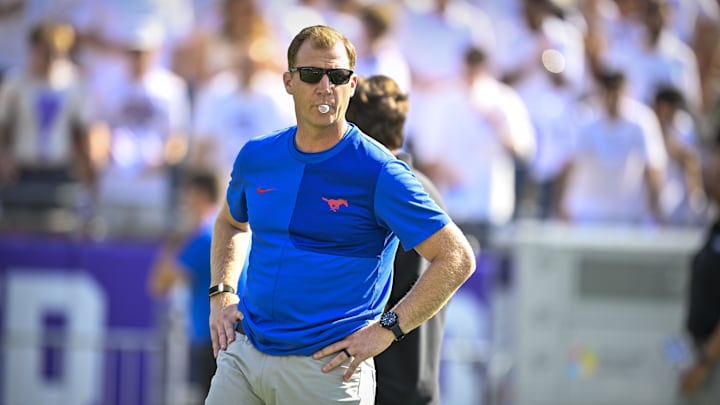With Arkansas football likely heading toward another coaching search, the conversation naturally turns to who could lead the Razorbacks into a new era. The next hire needs to blend recruiting chops, offensive innovation, and momentum in his coaching career.
Among the most talked-about names are Rhett Lashlee (SMU), Alex Golesh (USF), Eric Morris (North Texas), and Billy Napier (Former Florida coach). Each brings something different to the table: from SEC experience to offensive firepower to in-state connections.
Here’s a look at how they stack up as potential fits for Arkansas.
1. Rhett Lashlee: Head Coach, SMU
If there’s a “dream fit” in this cycle for Arkansas, it’s Rhett Lashlee.
A Springdale, Arkansas native and former Razorback quarterback (2002–2004), Lashlee’s ties to the state run deep. His coaching resume has steadily built credibility, from his time as an offensive coordinator under Gus Malzahn to now leading SMU into national relevance.
Even after signing a contract extension with the Mustangs, Lashlee’s combination of hometown roots, offensive pedigree, and familiarity with Arkansas’ culture make him the clear top target.
The SEC’s money and brand power can change minds quickly, and for a coach who grew up dreaming in cardinal and white, returning home to lead Arkansas might be too tempting to ignore.
2. Alex Golesh: Head Coach, South Florida
Alex Golesh has quickly become one of the hottest names in the Group of Five coaching ranks. In his third season at USF, he’s guided the Bulls to a 6–2 start with signature wins over Boise State, Florida, and North Texas. His teams are known for their explosive, high-tempo offenses and detailed player development.
Golesh’s recruiting chops are another major plus as he helped Toledo land back-to-back No. 1 recruiting classes in the MAC early in his career. He’s also served as a tight ends coach, running backs coach, and special teams coordinator, showing a well-rounded football mind.
Perhaps the biggest connection? His wife is from Arkansas and still travels there for work, this being a personal tie that could give the Razorbacks an edge if they move early. Golesh checks nearly every box for a modern SEC program: youth, energy, and an innovative offensive identity.
3. Eric Morris: Head Coach, North Texas
Eric Morris has turned North Texas into one of college football’s best stories. Sitting at 8–1 with a statement win over previously unbeaten Navy, the Mean Green are playing their best football in school history and even whispering the unthinkable: a College Football Playoff bid.
Morris, a former Mike Leach disciple, brings a modern, creative offensive approach that’s made UNT must-watch football. If he somehow takes North Texas to the playoff, Arkansas would have to be patient as it's possible his season wouldn’t end until late December.
Still, the idea of bringing both Morris and his star quarterback Drew Mestemaker to Fayetteville could be incredibly enticing. He’s a rising star, but perhaps a year or two away from being fully ready for an SEC rebuild.
4. Billy Napier: Former Head Coach, Florida
Billy Napier’s tenure at Florida was uneven, but his track record shouldn’t be dismissed. He’s a proven recruiter with experience navigating the challenges of the SEC and building rosters from the ground up.
At Louisiana, Napier was a consistent winner and a master organizer. At Florida, he struggled with staff structure and in-game management which could be lessons that might make him stronger the second time around.
For Arkansas, Napier represents a safer, experienced option. He knows the SEC grind, recruits the region well, and might come with a talented quarterback like DJ Lagway if the timing aligns. Still, after recent struggles, he feels more like a bounce-back candidate than a home-run hire.
Bottom Line
Arkansas needs a builder. Someone who can energize the fanbase, recruit at an SEC level, and modernize the offense. Rhett Lashlee feels like the natural choice, but names like Alex Golesh and Eric Morris offer intriguing upside. With several potential fits on the board, Arkansas’ next move could define the program’s direction for the next decade.
